Entrepreneurial Ventures & Exploration of Business Mindset Report
VerifiedAdded on 2022/01/21
|84
|9422
|120
Report
AI Summary
This report, prepared for a Higher National Certificate/Diploma in Business program, delves into the multifaceted world of entrepreneurship and small business management. It begins by examining different types of entrepreneurial ventures, including private, corporate, public, and social enterprises, illustrating their relationship to the typology of entrepreneurship. The report then explores the similarities and differences between these ventures, providing real-world examples such as Café Coffee Day, Hero MotoCorp, Bank of India, and Mann Deshi Mahila Sahakari Bank Ltd. It assesses the impact of micro and small businesses on the economy using relevant data and statistics, while also explaining the importance of small businesses and start-ups to the growth of the social economy. Furthermore, the report identifies the key characteristics, traits, and skills of successful entrepreneurs, differentiating them from other business managers. It also assesses how aspects of the entrepreneurial personality reflect entrepreneurial motivation and mindset. Finally, the report examines how background and experience can either hinder or foster entrepreneurship, supported by specific examples, and concludes with a summary of the key findings.
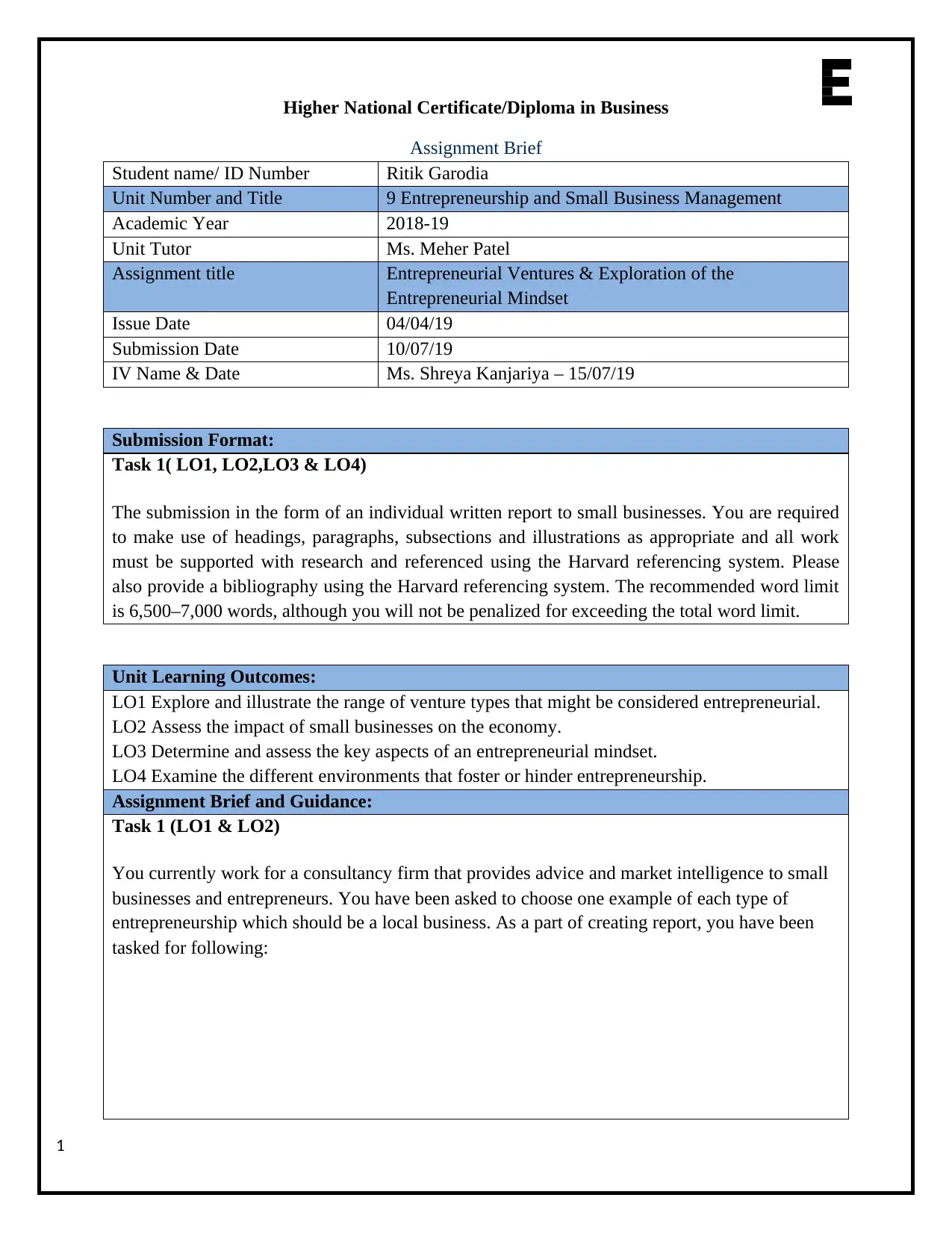
Higher National Certificate/Diploma in Business
Assignment Brief
Student name/ ID Number Ritik Garodia
Unit Number and Title 9 Entrepreneurship and Small Business Management
Academic Year 2018-19
Unit Tutor Ms. Meher Patel
Assignment title Entrepreneurial Ventures & Exploration of the
Entrepreneurial Mindset
Issue Date 04/04/19
Submission Date 10/07/19
IV Name & Date Ms. Shreya Kanjariya – 15/07/19
Submission Format:
Task 1( LO1, LO2,LO3 & LO4)
The submission in the form of an individual written report to small businesses. You are required
to make use of headings, paragraphs, subsections and illustrations as appropriate and all work
must be supported with research and referenced using the Harvard referencing system. Please
also provide a bibliography using the Harvard referencing system. The recommended word limit
is 6,500–7,000 words, although you will not be penalized for exceeding the total word limit.
Unit Learning Outcomes:
LO1 Explore and illustrate the range of venture types that might be considered entrepreneurial.
LO2 Assess the impact of small businesses on the economy.
LO3 Determine and assess the key aspects of an entrepreneurial mindset.
LO4 Examine the different environments that foster or hinder entrepreneurship.
Assignment Brief and Guidance:
Task 1 (LO1 & LO2)
You currently work for a consultancy firm that provides advice and market intelligence to small
businesses and entrepreneurs. You have been asked to choose one example of each type of
entrepreneurship which should be a local business. As a part of creating report, you have been
tasked for following:
1
Assignment Brief
Student name/ ID Number Ritik Garodia
Unit Number and Title 9 Entrepreneurship and Small Business Management
Academic Year 2018-19
Unit Tutor Ms. Meher Patel
Assignment title Entrepreneurial Ventures & Exploration of the
Entrepreneurial Mindset
Issue Date 04/04/19
Submission Date 10/07/19
IV Name & Date Ms. Shreya Kanjariya – 15/07/19
Submission Format:
Task 1( LO1, LO2,LO3 & LO4)
The submission in the form of an individual written report to small businesses. You are required
to make use of headings, paragraphs, subsections and illustrations as appropriate and all work
must be supported with research and referenced using the Harvard referencing system. Please
also provide a bibliography using the Harvard referencing system. The recommended word limit
is 6,500–7,000 words, although you will not be penalized for exceeding the total word limit.
Unit Learning Outcomes:
LO1 Explore and illustrate the range of venture types that might be considered entrepreneurial.
LO2 Assess the impact of small businesses on the economy.
LO3 Determine and assess the key aspects of an entrepreneurial mindset.
LO4 Examine the different environments that foster or hinder entrepreneurship.
Assignment Brief and Guidance:
Task 1 (LO1 & LO2)
You currently work for a consultancy firm that provides advice and market intelligence to small
businesses and entrepreneurs. You have been asked to choose one example of each type of
entrepreneurship which should be a local business. As a part of creating report, you have been
tasked for following:
1
Paraphrase This Document
Need a fresh take? Get an instant paraphrase of this document with our AI Paraphraser
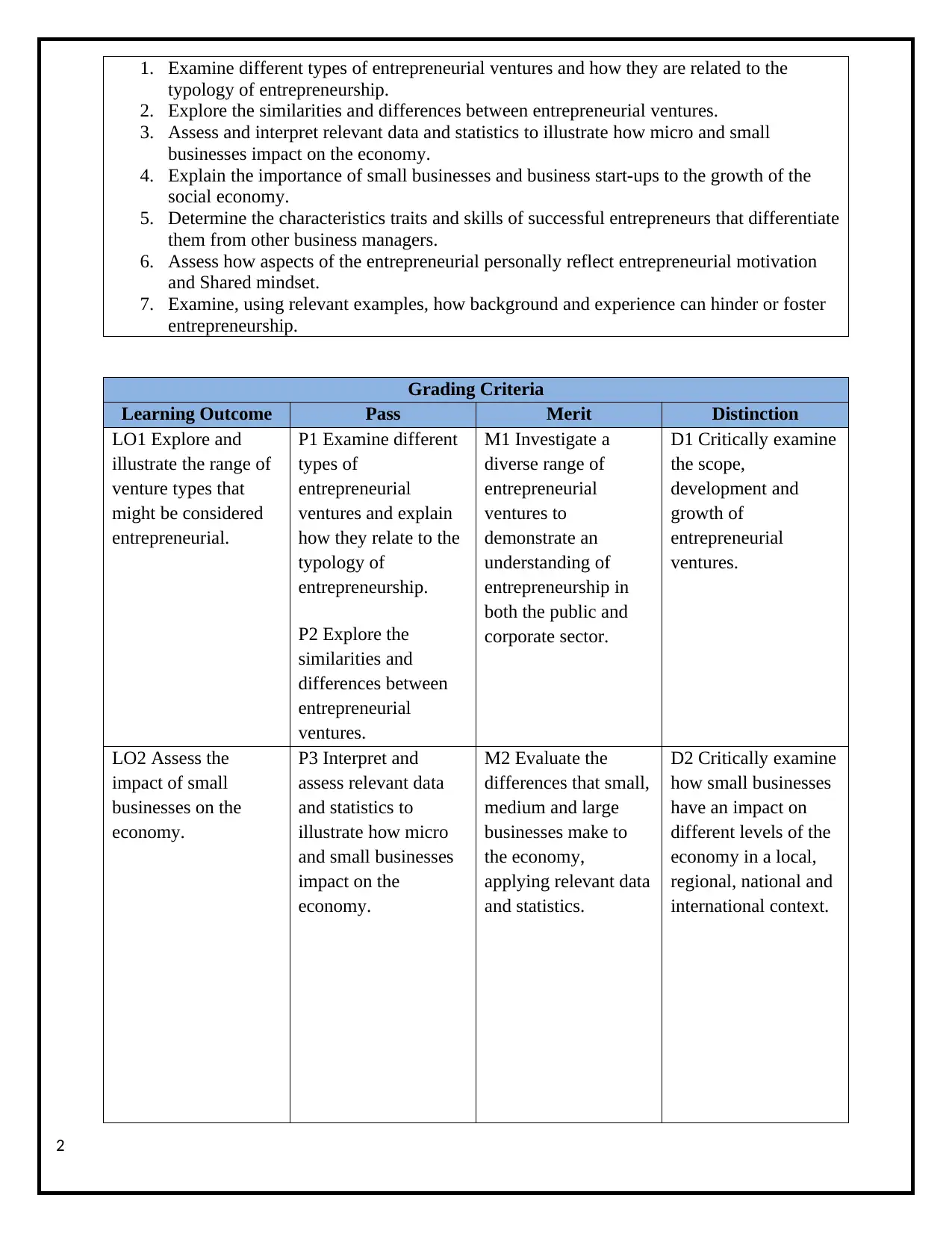
1. Examine different types of entrepreneurial ventures and how they are related to the
typology of entrepreneurship.
2. Explore the similarities and differences between entrepreneurial ventures.
3. Assess and interpret relevant data and statistics to illustrate how micro and small
businesses impact on the economy.
4. Explain the importance of small businesses and business start-ups to the growth of the
social economy.
5. Determine the characteristics traits and skills of successful entrepreneurs that differentiate
them from other business managers.
6. Assess how aspects of the entrepreneurial personally reflect entrepreneurial motivation
and Shared mindset.
7. Examine, using relevant examples, how background and experience can hinder or foster
entrepreneurship.
Grading Criteria
Learning Outcome Pass Merit Distinction
LO1 Explore and
illustrate the range of
venture types that
might be considered
entrepreneurial.
P1 Examine different
types of
entrepreneurial
ventures and explain
how they relate to the
typology of
entrepreneurship.
P2 Explore the
similarities and
differences between
entrepreneurial
ventures.
M1 Investigate a
diverse range of
entrepreneurial
ventures to
demonstrate an
understanding of
entrepreneurship in
both the public and
corporate sector.
D1 Critically examine
the scope,
development and
growth of
entrepreneurial
ventures.
LO2 Assess the
impact of small
businesses on the
economy.
P3 Interpret and
assess relevant data
and statistics to
illustrate how micro
and small businesses
impact on the
economy.
M2 Evaluate the
differences that small,
medium and large
businesses make to
the economy,
applying relevant data
and statistics.
D2 Critically examine
how small businesses
have an impact on
different levels of the
economy in a local,
regional, national and
international context.
2
typology of entrepreneurship.
2. Explore the similarities and differences between entrepreneurial ventures.
3. Assess and interpret relevant data and statistics to illustrate how micro and small
businesses impact on the economy.
4. Explain the importance of small businesses and business start-ups to the growth of the
social economy.
5. Determine the characteristics traits and skills of successful entrepreneurs that differentiate
them from other business managers.
6. Assess how aspects of the entrepreneurial personally reflect entrepreneurial motivation
and Shared mindset.
7. Examine, using relevant examples, how background and experience can hinder or foster
entrepreneurship.
Grading Criteria
Learning Outcome Pass Merit Distinction
LO1 Explore and
illustrate the range of
venture types that
might be considered
entrepreneurial.
P1 Examine different
types of
entrepreneurial
ventures and explain
how they relate to the
typology of
entrepreneurship.
P2 Explore the
similarities and
differences between
entrepreneurial
ventures.
M1 Investigate a
diverse range of
entrepreneurial
ventures to
demonstrate an
understanding of
entrepreneurship in
both the public and
corporate sector.
D1 Critically examine
the scope,
development and
growth of
entrepreneurial
ventures.
LO2 Assess the
impact of small
businesses on the
economy.
P3 Interpret and
assess relevant data
and statistics to
illustrate how micro
and small businesses
impact on the
economy.
M2 Evaluate the
differences that small,
medium and large
businesses make to
the economy,
applying relevant data
and statistics.
D2 Critically examine
how small businesses
have an impact on
different levels of the
economy in a local,
regional, national and
international context.
2
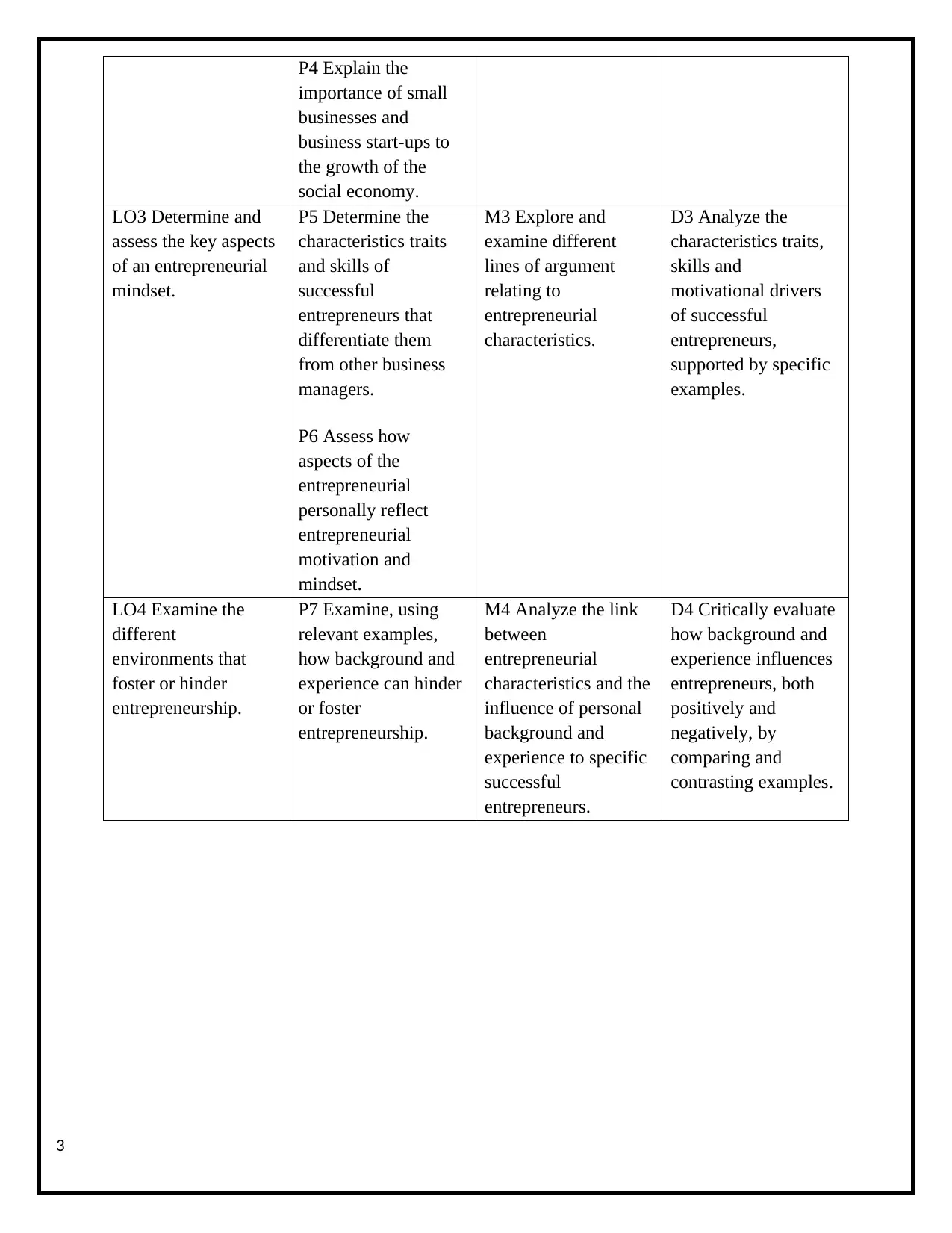
P4 Explain the
importance of small
businesses and
business start-ups to
the growth of the
social economy.
LO3 Determine and
assess the key aspects
of an entrepreneurial
mindset.
P5 Determine the
characteristics traits
and skills of
successful
entrepreneurs that
differentiate them
from other business
managers.
P6 Assess how
aspects of the
entrepreneurial
personally reflect
entrepreneurial
motivation and
mindset.
M3 Explore and
examine different
lines of argument
relating to
entrepreneurial
characteristics.
D3 Analyze the
characteristics traits,
skills and
motivational drivers
of successful
entrepreneurs,
supported by specific
examples.
LO4 Examine the
different
environments that
foster or hinder
entrepreneurship.
P7 Examine, using
relevant examples,
how background and
experience can hinder
or foster
entrepreneurship.
M4 Analyze the link
between
entrepreneurial
characteristics and the
influence of personal
background and
experience to specific
successful
entrepreneurs.
D4 Critically evaluate
how background and
experience influences
entrepreneurs, both
positively and
negatively, by
comparing and
contrasting examples.
3
importance of small
businesses and
business start-ups to
the growth of the
social economy.
LO3 Determine and
assess the key aspects
of an entrepreneurial
mindset.
P5 Determine the
characteristics traits
and skills of
successful
entrepreneurs that
differentiate them
from other business
managers.
P6 Assess how
aspects of the
entrepreneurial
personally reflect
entrepreneurial
motivation and
mindset.
M3 Explore and
examine different
lines of argument
relating to
entrepreneurial
characteristics.
D3 Analyze the
characteristics traits,
skills and
motivational drivers
of successful
entrepreneurs,
supported by specific
examples.
LO4 Examine the
different
environments that
foster or hinder
entrepreneurship.
P7 Examine, using
relevant examples,
how background and
experience can hinder
or foster
entrepreneurship.
M4 Analyze the link
between
entrepreneurial
characteristics and the
influence of personal
background and
experience to specific
successful
entrepreneurs.
D4 Critically evaluate
how background and
experience influences
entrepreneurs, both
positively and
negatively, by
comparing and
contrasting examples.
3
⊘ This is a preview!⊘
Do you want full access?
Subscribe today to unlock all pages.

Trusted by 1+ million students worldwide
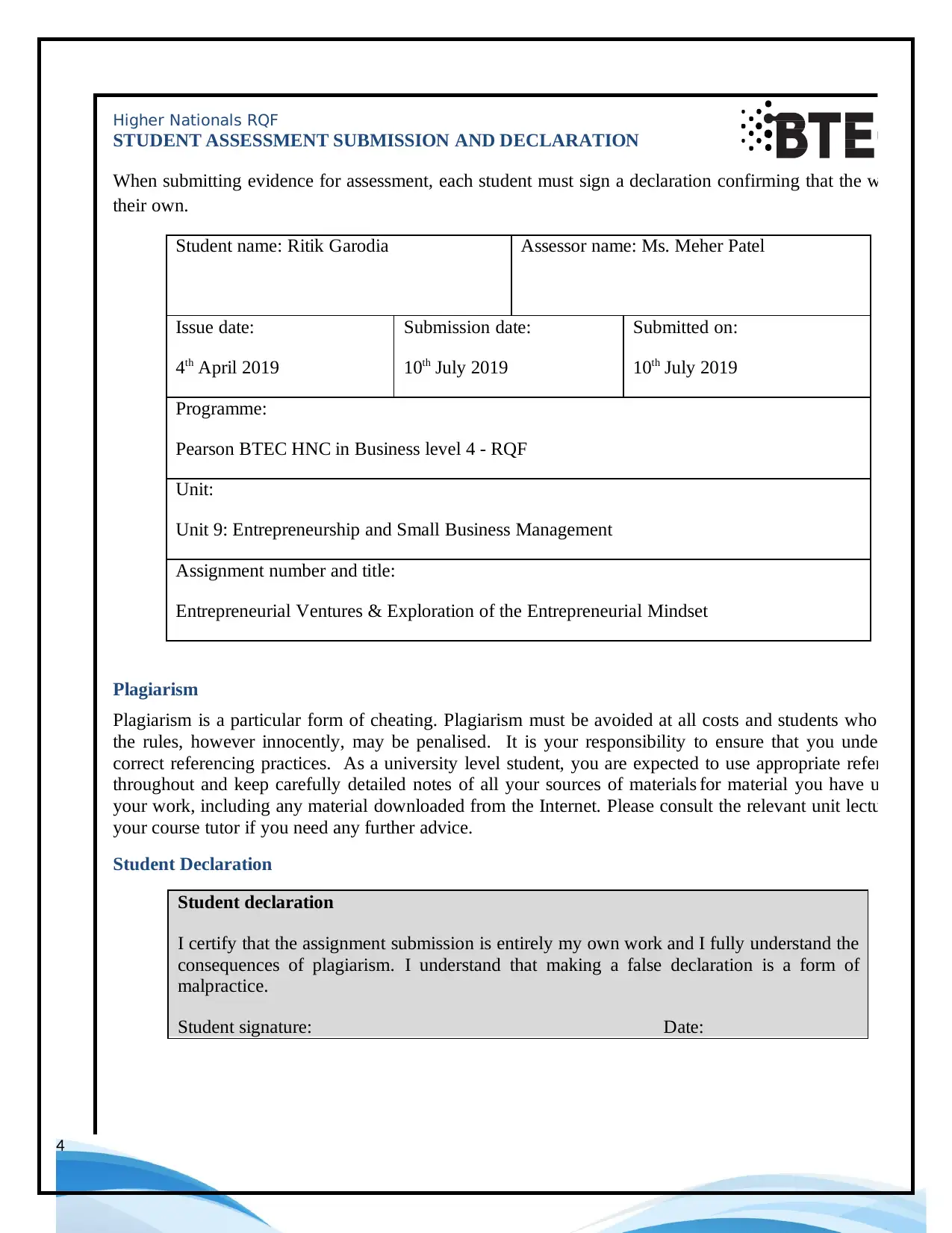
Higher Nationals RQF
STUDENT ASSESSMENT SUBMISSION AND DECLARATION
When submitting evidence for assessment, each student must sign a declaration confirming that the work is
their own.
Student name: Ritik Garodia Assessor name: Ms. Meher Patel
Issue date:
4th April 2019
Submission date:
10th July 2019
Submitted on:
10th July 2019
Programme:
Pearson BTEC HNC in Business level 4 - RQF
Unit:
Unit 9: Entrepreneurship and Small Business Management
Assignment number and title:
Entrepreneurial Ventures & Exploration of the Entrepreneurial Mindset
Plagiarism
Plagiarism is a particular form of cheating. Plagiarism must be avoided at all costs and students who break
the rules, however innocently, may be penalised. It is your responsibility to ensure that you understand
correct referencing practices. As a university level student, you are expected to use appropriate references
throughout and keep carefully detailed notes of all your sources of materials for material you have used in
your work, including any material downloaded from the Internet. Please consult the relevant unit lecturer or
your course tutor if you need any further advice.
Student Declaration
Student declaration
I certify that the assignment submission is entirely my own work and I fully understand the
consequences of plagiarism. I understand that making a false declaration is a form of
malpractice.
Student signature: Date:
4
STUDENT ASSESSMENT SUBMISSION AND DECLARATION
When submitting evidence for assessment, each student must sign a declaration confirming that the work is
their own.
Student name: Ritik Garodia Assessor name: Ms. Meher Patel
Issue date:
4th April 2019
Submission date:
10th July 2019
Submitted on:
10th July 2019
Programme:
Pearson BTEC HNC in Business level 4 - RQF
Unit:
Unit 9: Entrepreneurship and Small Business Management
Assignment number and title:
Entrepreneurial Ventures & Exploration of the Entrepreneurial Mindset
Plagiarism
Plagiarism is a particular form of cheating. Plagiarism must be avoided at all costs and students who break
the rules, however innocently, may be penalised. It is your responsibility to ensure that you understand
correct referencing practices. As a university level student, you are expected to use appropriate references
throughout and keep carefully detailed notes of all your sources of materials for material you have used in
your work, including any material downloaded from the Internet. Please consult the relevant unit lecturer or
your course tutor if you need any further advice.
Student Declaration
Student declaration
I certify that the assignment submission is entirely my own work and I fully understand the
consequences of plagiarism. I understand that making a false declaration is a form of
malpractice.
Student signature: Date:
4
Paraphrase This Document
Need a fresh take? Get an instant paraphrase of this document with our AI Paraphraser
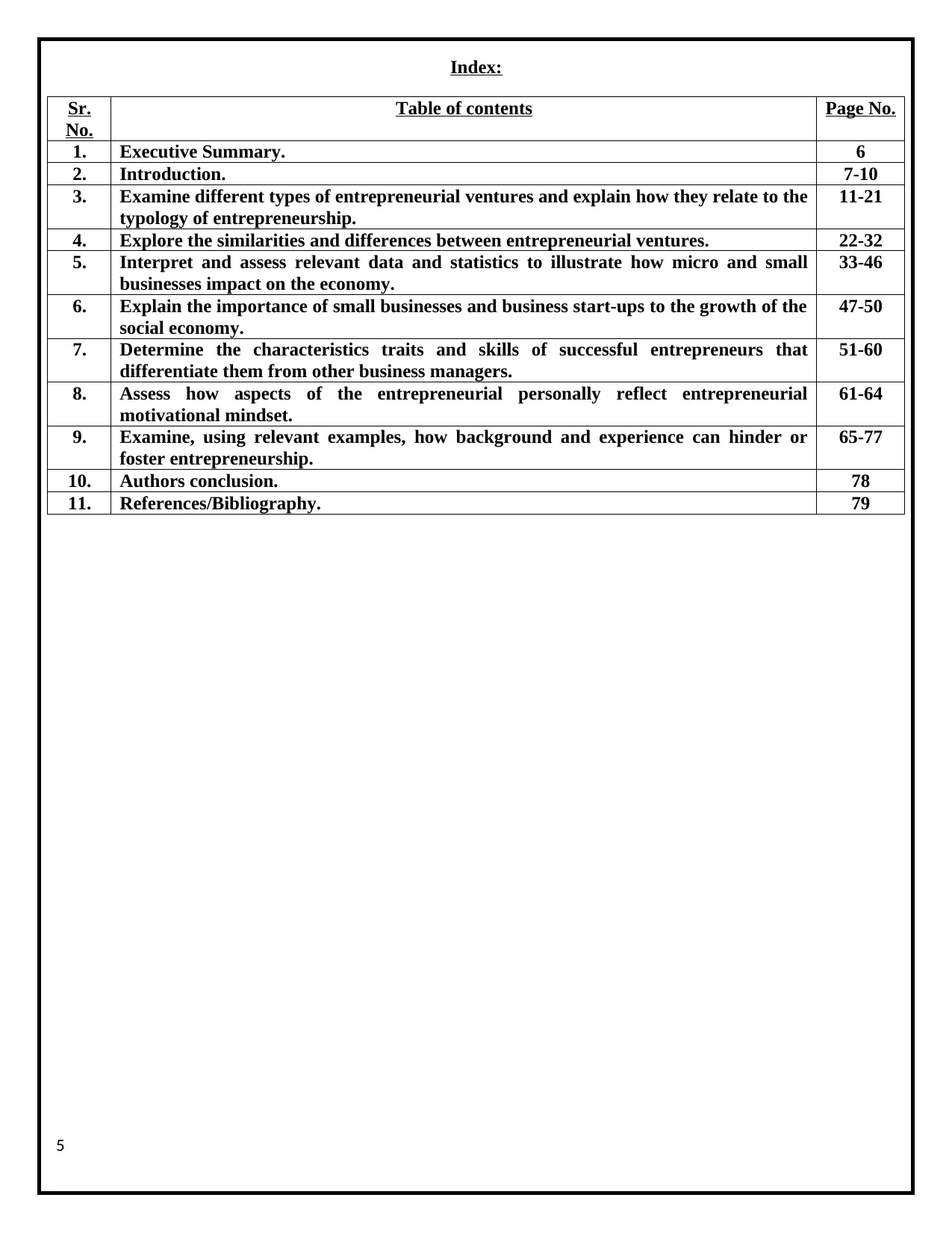
Index:
Sr.
No.
Table of contents Page No.
1. Executive Summary. 6
2. Introduction. 7-10
3. Examine different types of entrepreneurial ventures and explain how they relate to the
typology of entrepreneurship.
11-21
4. Explore the similarities and differences between entrepreneurial ventures. 22-32
5. Interpret and assess relevant data and statistics to illustrate how micro and small
businesses impact on the economy.
33-46
6. Explain the importance of small businesses and business start-ups to the growth of the
social economy.
47-50
7. Determine the characteristics traits and skills of successful entrepreneurs that
differentiate them from other business managers.
51-60
8. Assess how aspects of the entrepreneurial personally reflect entrepreneurial
motivational mindset.
61-64
9. Examine, using relevant examples, how background and experience can hinder or
foster entrepreneurship.
65-77
10. Authors conclusion. 78
11. References/Bibliography. 79
5
Sr.
No.
Table of contents Page No.
1. Executive Summary. 6
2. Introduction. 7-10
3. Examine different types of entrepreneurial ventures and explain how they relate to the
typology of entrepreneurship.
11-21
4. Explore the similarities and differences between entrepreneurial ventures. 22-32
5. Interpret and assess relevant data and statistics to illustrate how micro and small
businesses impact on the economy.
33-46
6. Explain the importance of small businesses and business start-ups to the growth of the
social economy.
47-50
7. Determine the characteristics traits and skills of successful entrepreneurs that
differentiate them from other business managers.
51-60
8. Assess how aspects of the entrepreneurial personally reflect entrepreneurial
motivational mindset.
61-64
9. Examine, using relevant examples, how background and experience can hinder or
foster entrepreneurship.
65-77
10. Authors conclusion. 78
11. References/Bibliography. 79
5
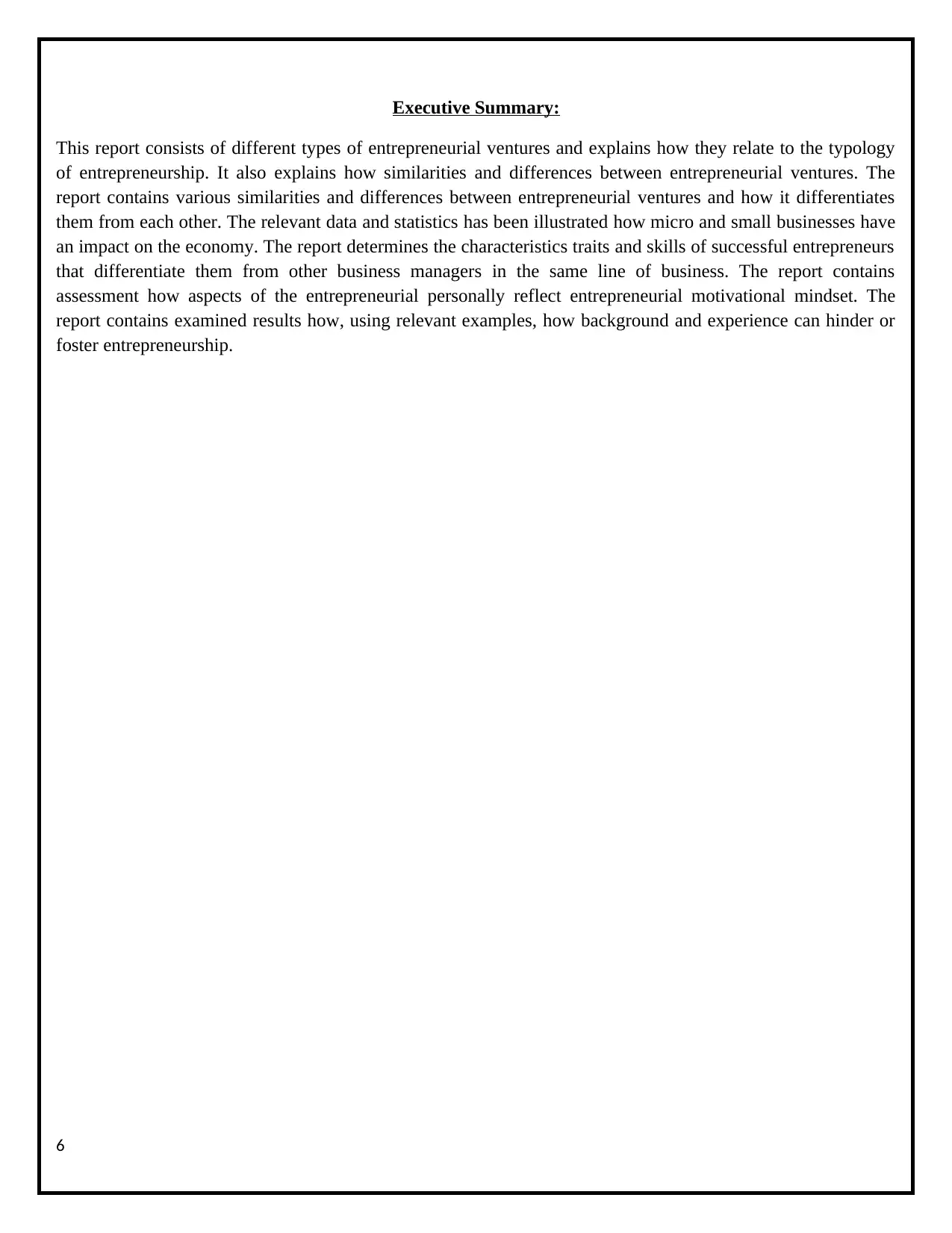
Executive Summary:
This report consists of different types of entrepreneurial ventures and explains how they relate to the typology
of entrepreneurship. It also explains how similarities and differences between entrepreneurial ventures. The
report contains various similarities and differences between entrepreneurial ventures and how it differentiates
them from each other. The relevant data and statistics has been illustrated how micro and small businesses have
an impact on the economy. The report determines the characteristics traits and skills of successful entrepreneurs
that differentiate them from other business managers in the same line of business. The report contains
assessment how aspects of the entrepreneurial personally reflect entrepreneurial motivational mindset. The
report contains examined results how, using relevant examples, how background and experience can hinder or
foster entrepreneurship.
6
This report consists of different types of entrepreneurial ventures and explains how they relate to the typology
of entrepreneurship. It also explains how similarities and differences between entrepreneurial ventures. The
report contains various similarities and differences between entrepreneurial ventures and how it differentiates
them from each other. The relevant data and statistics has been illustrated how micro and small businesses have
an impact on the economy. The report determines the characteristics traits and skills of successful entrepreneurs
that differentiate them from other business managers in the same line of business. The report contains
assessment how aspects of the entrepreneurial personally reflect entrepreneurial motivational mindset. The
report contains examined results how, using relevant examples, how background and experience can hinder or
foster entrepreneurship.
6
⊘ This is a preview!⊘
Do you want full access?
Subscribe today to unlock all pages.

Trusted by 1+ million students worldwide
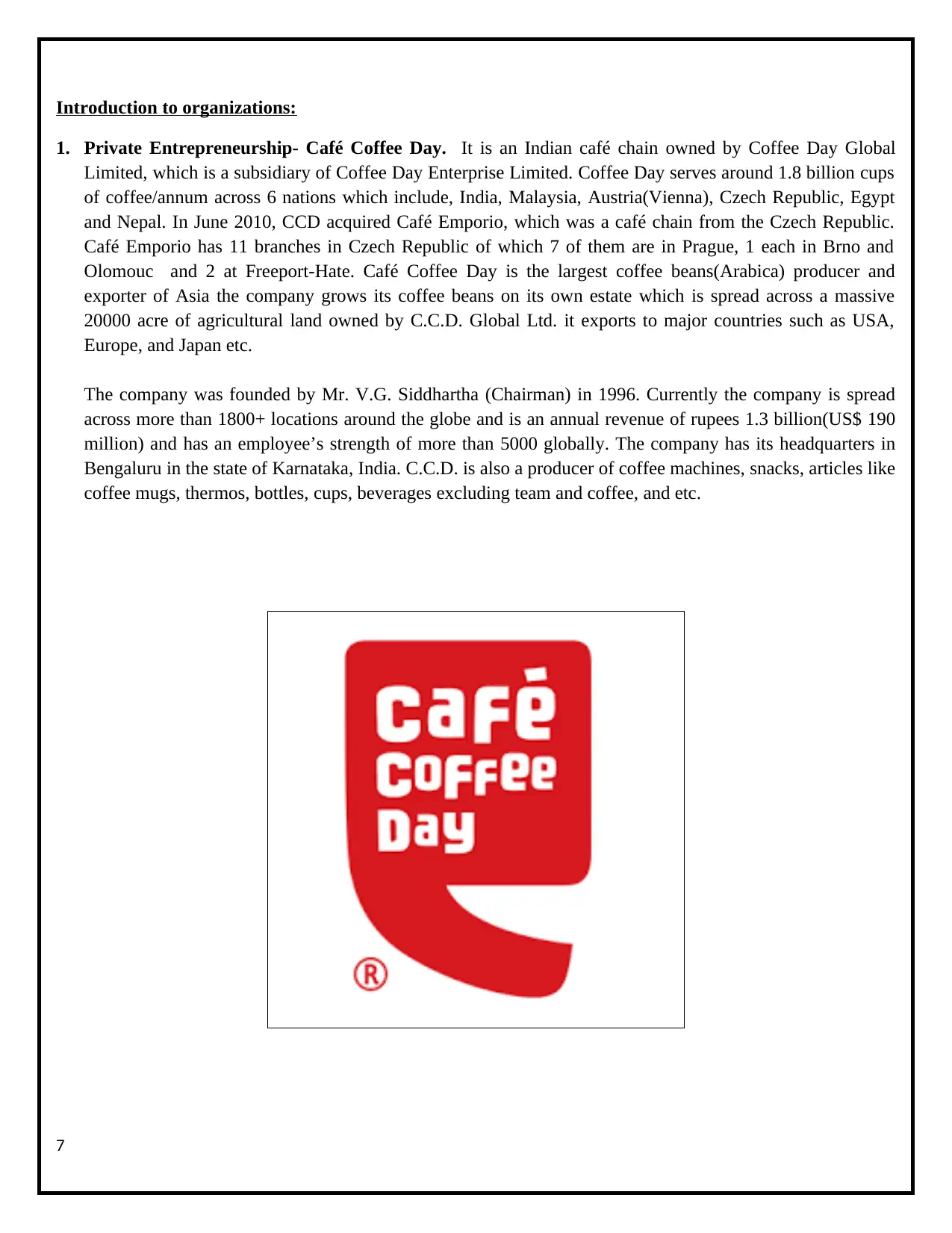
Introduction to organizations:
1. Private Entrepreneurship- Café Coffee Day. It is an Indian café chain owned by Coffee Day Global
Limited, which is a subsidiary of Coffee Day Enterprise Limited. Coffee Day serves around 1.8 billion cups
of coffee/annum across 6 nations which include, India, Malaysia, Austria(Vienna), Czech Republic, Egypt
and Nepal. In June 2010, CCD acquired Café Emporio, which was a café chain from the Czech Republic.
Café Emporio has 11 branches in Czech Republic of which 7 of them are in Prague, 1 each in Brno and
Olomouc and 2 at Freeport-Hate. Café Coffee Day is the largest coffee beans(Arabica) producer and
exporter of Asia the company grows its coffee beans on its own estate which is spread across a massive
20000 acre of agricultural land owned by C.C.D. Global Ltd. it exports to major countries such as USA,
Europe, and Japan etc.
The company was founded by Mr. V.G. Siddhartha (Chairman) in 1996. Currently the company is spread
across more than 1800+ locations around the globe and is an annual revenue of rupees 1.3 billion(US$ 190
million) and has an employee’s strength of more than 5000 globally. The company has its headquarters in
Bengaluru in the state of Karnataka, India. C.C.D. is also a producer of coffee machines, snacks, articles like
coffee mugs, thermos, bottles, cups, beverages excluding team and coffee, and etc.
7
1. Private Entrepreneurship- Café Coffee Day. It is an Indian café chain owned by Coffee Day Global
Limited, which is a subsidiary of Coffee Day Enterprise Limited. Coffee Day serves around 1.8 billion cups
of coffee/annum across 6 nations which include, India, Malaysia, Austria(Vienna), Czech Republic, Egypt
and Nepal. In June 2010, CCD acquired Café Emporio, which was a café chain from the Czech Republic.
Café Emporio has 11 branches in Czech Republic of which 7 of them are in Prague, 1 each in Brno and
Olomouc and 2 at Freeport-Hate. Café Coffee Day is the largest coffee beans(Arabica) producer and
exporter of Asia the company grows its coffee beans on its own estate which is spread across a massive
20000 acre of agricultural land owned by C.C.D. Global Ltd. it exports to major countries such as USA,
Europe, and Japan etc.
The company was founded by Mr. V.G. Siddhartha (Chairman) in 1996. Currently the company is spread
across more than 1800+ locations around the globe and is an annual revenue of rupees 1.3 billion(US$ 190
million) and has an employee’s strength of more than 5000 globally. The company has its headquarters in
Bengaluru in the state of Karnataka, India. C.C.D. is also a producer of coffee machines, snacks, articles like
coffee mugs, thermos, bottles, cups, beverages excluding team and coffee, and etc.
7
Paraphrase This Document
Need a fresh take? Get an instant paraphrase of this document with our AI Paraphraser
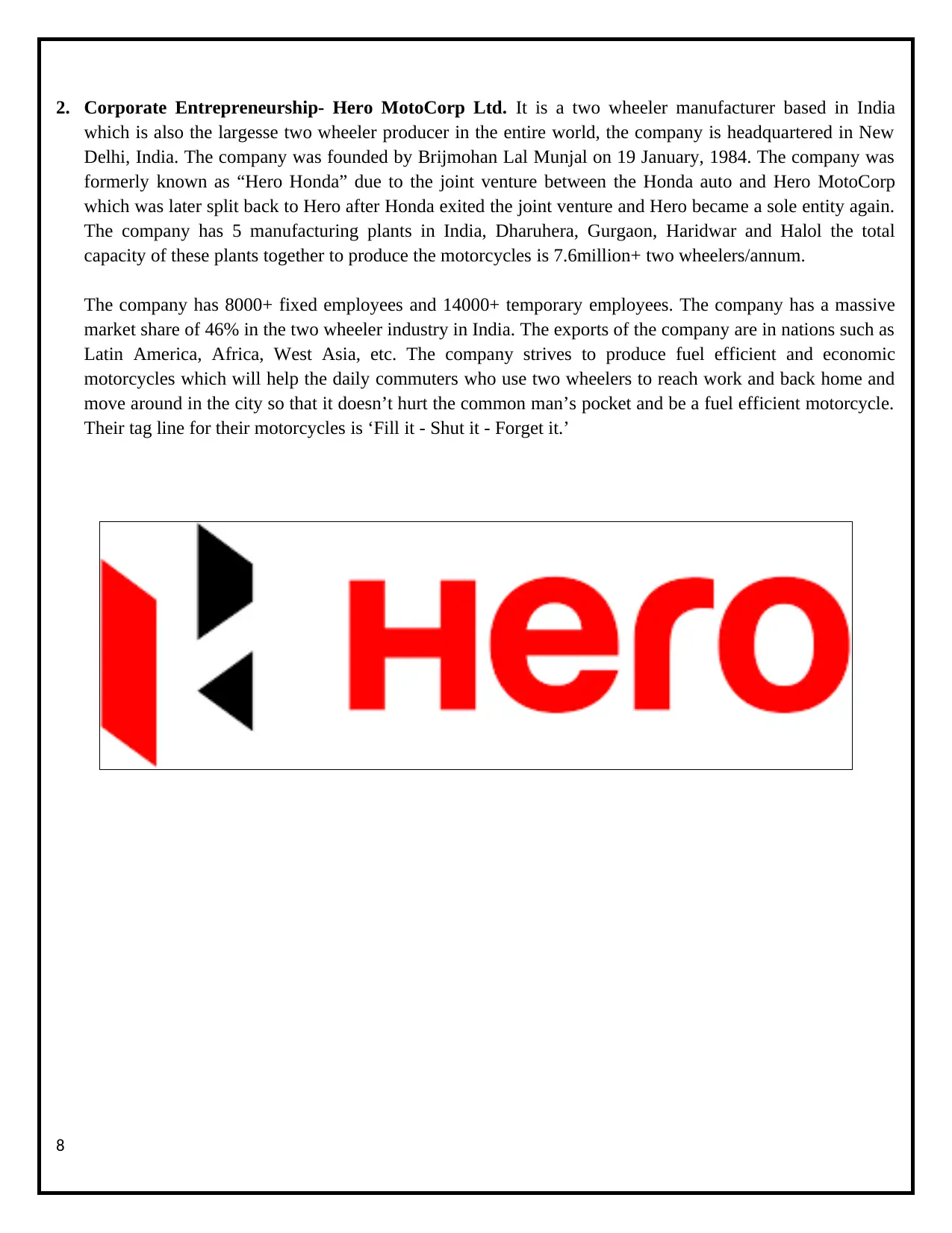
2. Corporate Entrepreneurship- Hero MotoCorp Ltd. It is a two wheeler manufacturer based in India
which is also the largesse two wheeler producer in the entire world, the company is headquartered in New
Delhi, India. The company was founded by Brijmohan Lal Munjal on 19 January, 1984. The company was
formerly known as “Hero Honda” due to the joint venture between the Honda auto and Hero MotoCorp
which was later split back to Hero after Honda exited the joint venture and Hero became a sole entity again.
The company has 5 manufacturing plants in India, Dharuhera, Gurgaon, Haridwar and Halol the total
capacity of these plants together to produce the motorcycles is 7.6million+ two wheelers/annum.
The company has 8000+ fixed employees and 14000+ temporary employees. The company has a massive
market share of 46% in the two wheeler industry in India. The exports of the company are in nations such as
Latin America, Africa, West Asia, etc. The company strives to produce fuel efficient and economic
motorcycles which will help the daily commuters who use two wheelers to reach work and back home and
move around in the city so that it doesn’t hurt the common man’s pocket and be a fuel efficient motorcycle.
Their tag line for their motorcycles is ‘Fill it - Shut it - Forget it.’
8
which is also the largesse two wheeler producer in the entire world, the company is headquartered in New
Delhi, India. The company was founded by Brijmohan Lal Munjal on 19 January, 1984. The company was
formerly known as “Hero Honda” due to the joint venture between the Honda auto and Hero MotoCorp
which was later split back to Hero after Honda exited the joint venture and Hero became a sole entity again.
The company has 5 manufacturing plants in India, Dharuhera, Gurgaon, Haridwar and Halol the total
capacity of these plants together to produce the motorcycles is 7.6million+ two wheelers/annum.
The company has 8000+ fixed employees and 14000+ temporary employees. The company has a massive
market share of 46% in the two wheeler industry in India. The exports of the company are in nations such as
Latin America, Africa, West Asia, etc. The company strives to produce fuel efficient and economic
motorcycles which will help the daily commuters who use two wheelers to reach work and back home and
move around in the city so that it doesn’t hurt the common man’s pocket and be a fuel efficient motorcycle.
Their tag line for their motorcycles is ‘Fill it - Shut it - Forget it.’
8
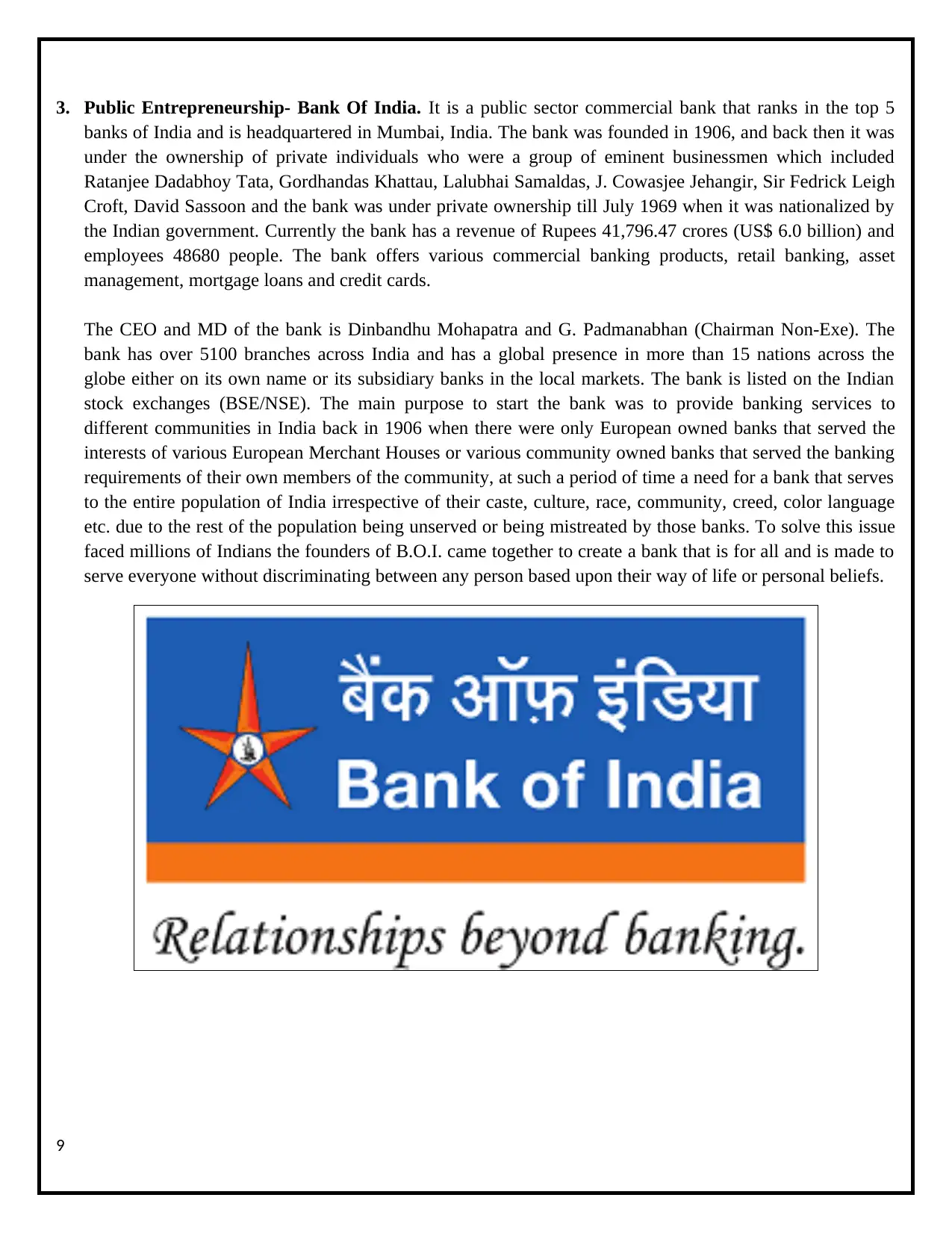
3. Public Entrepreneurship- Bank Of India. It is a public sector commercial bank that ranks in the top 5
banks of India and is headquartered in Mumbai, India. The bank was founded in 1906, and back then it was
under the ownership of private individuals who were a group of eminent businessmen which included
Ratanjee Dadabhoy Tata, Gordhandas Khattau, Lalubhai Samaldas, J. Cowasjee Jehangir, Sir Fedrick Leigh
Croft, David Sassoon and the bank was under private ownership till July 1969 when it was nationalized by
the Indian government. Currently the bank has a revenue of Rupees 41,796.47 crores (US$ 6.0 billion) and
employees 48680 people. The bank offers various commercial banking products, retail banking, asset
management, mortgage loans and credit cards.
The CEO and MD of the bank is Dinbandhu Mohapatra and G. Padmanabhan (Chairman Non-Exe). The
bank has over 5100 branches across India and has a global presence in more than 15 nations across the
globe either on its own name or its subsidiary banks in the local markets. The bank is listed on the Indian
stock exchanges (BSE/NSE). The main purpose to start the bank was to provide banking services to
different communities in India back in 1906 when there were only European owned banks that served the
interests of various European Merchant Houses or various community owned banks that served the banking
requirements of their own members of the community, at such a period of time a need for a bank that serves
to the entire population of India irrespective of their caste, culture, race, community, creed, color language
etc. due to the rest of the population being unserved or being mistreated by those banks. To solve this issue
faced millions of Indians the founders of B.O.I. came together to create a bank that is for all and is made to
serve everyone without discriminating between any person based upon their way of life or personal beliefs.
9
banks of India and is headquartered in Mumbai, India. The bank was founded in 1906, and back then it was
under the ownership of private individuals who were a group of eminent businessmen which included
Ratanjee Dadabhoy Tata, Gordhandas Khattau, Lalubhai Samaldas, J. Cowasjee Jehangir, Sir Fedrick Leigh
Croft, David Sassoon and the bank was under private ownership till July 1969 when it was nationalized by
the Indian government. Currently the bank has a revenue of Rupees 41,796.47 crores (US$ 6.0 billion) and
employees 48680 people. The bank offers various commercial banking products, retail banking, asset
management, mortgage loans and credit cards.
The CEO and MD of the bank is Dinbandhu Mohapatra and G. Padmanabhan (Chairman Non-Exe). The
bank has over 5100 branches across India and has a global presence in more than 15 nations across the
globe either on its own name or its subsidiary banks in the local markets. The bank is listed on the Indian
stock exchanges (BSE/NSE). The main purpose to start the bank was to provide banking services to
different communities in India back in 1906 when there were only European owned banks that served the
interests of various European Merchant Houses or various community owned banks that served the banking
requirements of their own members of the community, at such a period of time a need for a bank that serves
to the entire population of India irrespective of their caste, culture, race, community, creed, color language
etc. due to the rest of the population being unserved or being mistreated by those banks. To solve this issue
faced millions of Indians the founders of B.O.I. came together to create a bank that is for all and is made to
serve everyone without discriminating between any person based upon their way of life or personal beliefs.
9
⊘ This is a preview!⊘
Do you want full access?
Subscribe today to unlock all pages.

Trusted by 1+ million students worldwide
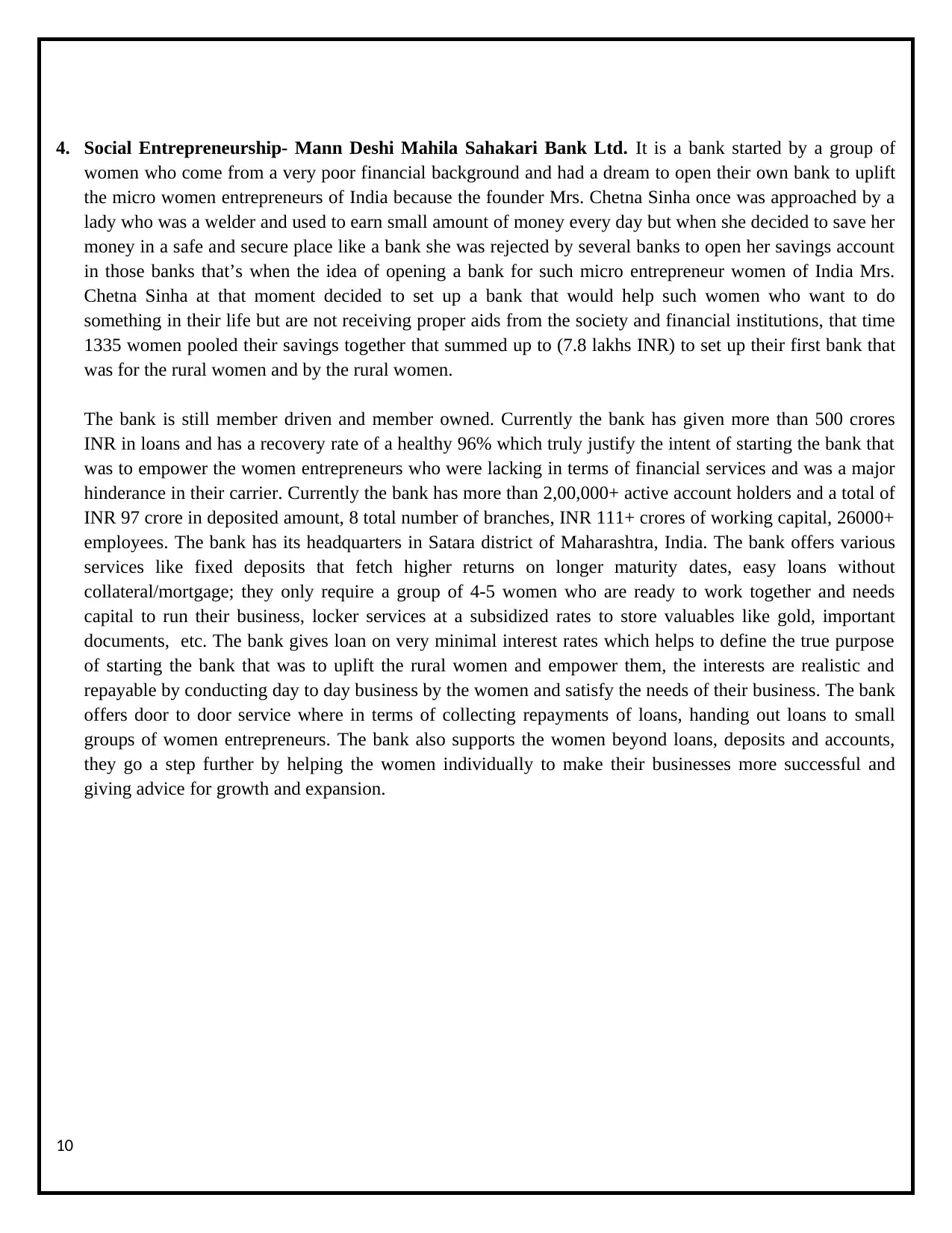
4. Social Entrepreneurship- Mann Deshi Mahila Sahakari Bank Ltd. It is a bank started by a group of
women who come from a very poor financial background and had a dream to open their own bank to uplift
the micro women entrepreneurs of India because the founder Mrs. Chetna Sinha once was approached by a
lady who was a welder and used to earn small amount of money every day but when she decided to save her
money in a safe and secure place like a bank she was rejected by several banks to open her savings account
in those banks that’s when the idea of opening a bank for such micro entrepreneur women of India Mrs.
Chetna Sinha at that moment decided to set up a bank that would help such women who want to do
something in their life but are not receiving proper aids from the society and financial institutions, that time
1335 women pooled their savings together that summed up to (7.8 lakhs INR) to set up their first bank that
was for the rural women and by the rural women.
The bank is still member driven and member owned. Currently the bank has given more than 500 crores
INR in loans and has a recovery rate of a healthy 96% which truly justify the intent of starting the bank that
was to empower the women entrepreneurs who were lacking in terms of financial services and was a major
hinderance in their carrier. Currently the bank has more than 2,00,000+ active account holders and a total of
INR 97 crore in deposited amount, 8 total number of branches, INR 111+ crores of working capital, 26000+
employees. The bank has its headquarters in Satara district of Maharashtra, India. The bank offers various
services like fixed deposits that fetch higher returns on longer maturity dates, easy loans without
collateral/mortgage; they only require a group of 4-5 women who are ready to work together and needs
capital to run their business, locker services at a subsidized rates to store valuables like gold, important
documents, etc. The bank gives loan on very minimal interest rates which helps to define the true purpose
of starting the bank that was to uplift the rural women and empower them, the interests are realistic and
repayable by conducting day to day business by the women and satisfy the needs of their business. The bank
offers door to door service where in terms of collecting repayments of loans, handing out loans to small
groups of women entrepreneurs. The bank also supports the women beyond loans, deposits and accounts,
they go a step further by helping the women individually to make their businesses more successful and
giving advice for growth and expansion.
10
women who come from a very poor financial background and had a dream to open their own bank to uplift
the micro women entrepreneurs of India because the founder Mrs. Chetna Sinha once was approached by a
lady who was a welder and used to earn small amount of money every day but when she decided to save her
money in a safe and secure place like a bank she was rejected by several banks to open her savings account
in those banks that’s when the idea of opening a bank for such micro entrepreneur women of India Mrs.
Chetna Sinha at that moment decided to set up a bank that would help such women who want to do
something in their life but are not receiving proper aids from the society and financial institutions, that time
1335 women pooled their savings together that summed up to (7.8 lakhs INR) to set up their first bank that
was for the rural women and by the rural women.
The bank is still member driven and member owned. Currently the bank has given more than 500 crores
INR in loans and has a recovery rate of a healthy 96% which truly justify the intent of starting the bank that
was to empower the women entrepreneurs who were lacking in terms of financial services and was a major
hinderance in their carrier. Currently the bank has more than 2,00,000+ active account holders and a total of
INR 97 crore in deposited amount, 8 total number of branches, INR 111+ crores of working capital, 26000+
employees. The bank has its headquarters in Satara district of Maharashtra, India. The bank offers various
services like fixed deposits that fetch higher returns on longer maturity dates, easy loans without
collateral/mortgage; they only require a group of 4-5 women who are ready to work together and needs
capital to run their business, locker services at a subsidized rates to store valuables like gold, important
documents, etc. The bank gives loan on very minimal interest rates which helps to define the true purpose
of starting the bank that was to uplift the rural women and empower them, the interests are realistic and
repayable by conducting day to day business by the women and satisfy the needs of their business. The bank
offers door to door service where in terms of collecting repayments of loans, handing out loans to small
groups of women entrepreneurs. The bank also supports the women beyond loans, deposits and accounts,
they go a step further by helping the women individually to make their businesses more successful and
giving advice for growth and expansion.
10
Paraphrase This Document
Need a fresh take? Get an instant paraphrase of this document with our AI Paraphraser
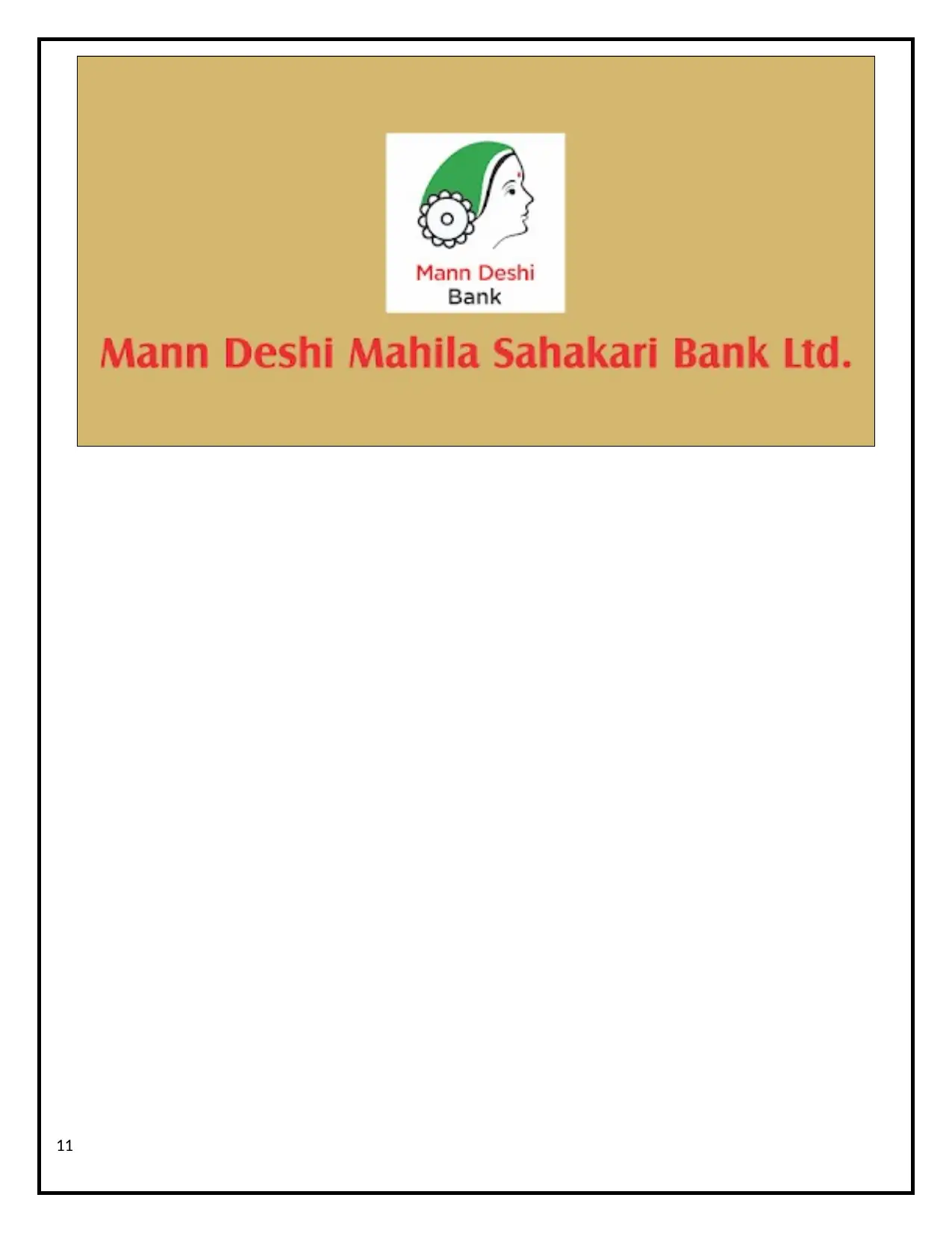
11
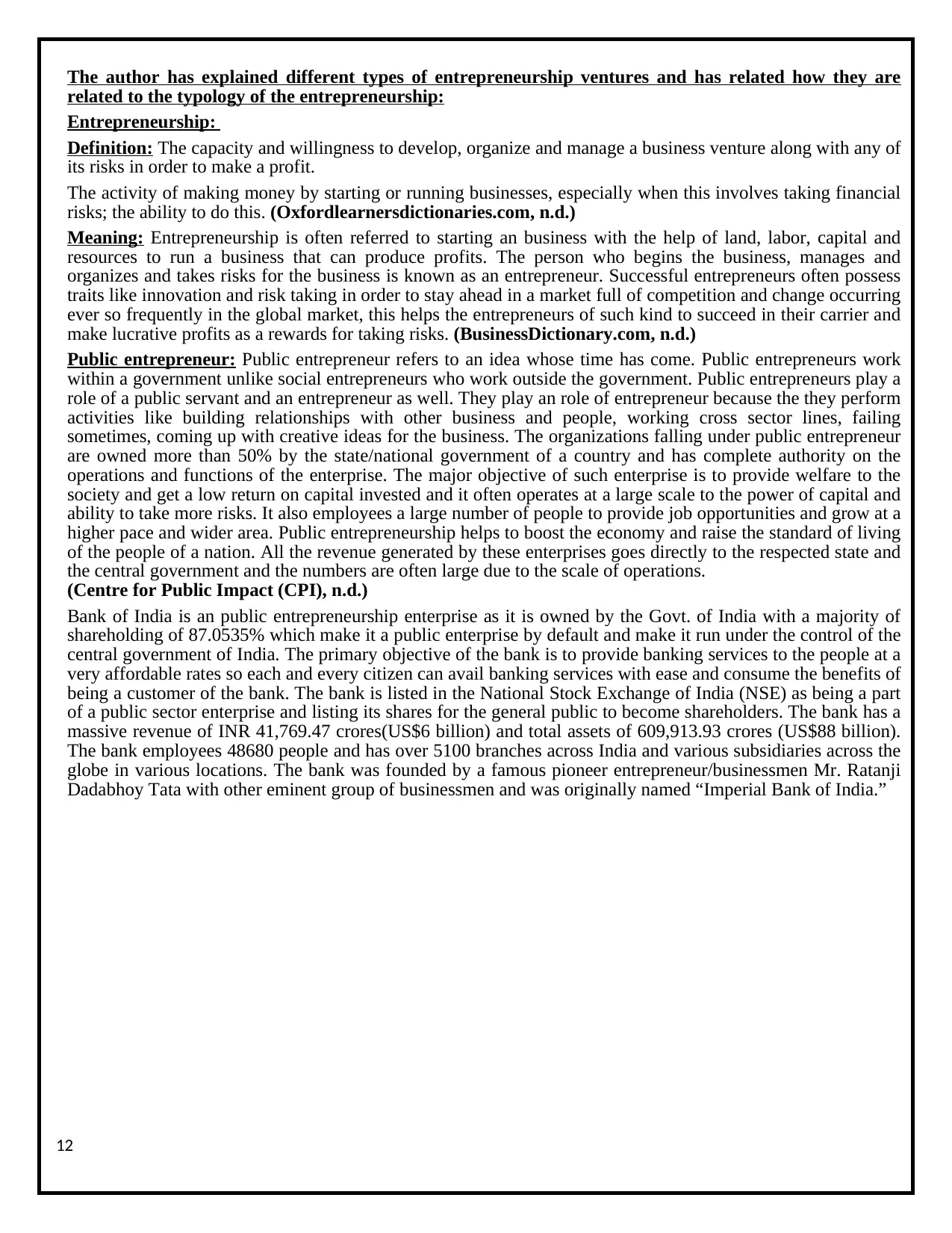
12
The author has explained different types of entrepreneurship ventures and has related how they are
related to the typology of the entrepreneurship:
Entrepreneurship:
Definition: The capacity and willingness to develop, organize and manage a business venture along with any of
its risks in order to make a profit.
The activity of making money by starting or running businesses, especially when this involves taking financial
risks; the ability to do this. (Oxfordlearnersdictionaries.com, n.d.)
Meaning: Entrepreneurship is often referred to starting an business with the help of land, labor, capital and
resources to run a business that can produce profits. The person who begins the business, manages and
organizes and takes risks for the business is known as an entrepreneur. Successful entrepreneurs often possess
traits like innovation and risk taking in order to stay ahead in a market full of competition and change occurring
ever so frequently in the global market, this helps the entrepreneurs of such kind to succeed in their carrier and
make lucrative profits as a rewards for taking risks. (BusinessDictionary.com, n.d.)
Public entrepreneur: Public entrepreneur refers to an idea whose time has come. Public entrepreneurs work
within a government unlike social entrepreneurs who work outside the government. Public entrepreneurs play a
role of a public servant and an entrepreneur as well. They play an role of entrepreneur because the they perform
activities like building relationships with other business and people, working cross sector lines, failing
sometimes, coming up with creative ideas for the business. The organizations falling under public entrepreneur
are owned more than 50% by the state/national government of a country and has complete authority on the
operations and functions of the enterprise. The major objective of such enterprise is to provide welfare to the
society and get a low return on capital invested and it often operates at a large scale to the power of capital and
ability to take more risks. It also employees a large number of people to provide job opportunities and grow at a
higher pace and wider area. Public entrepreneurship helps to boost the economy and raise the standard of living
of the people of a nation. All the revenue generated by these enterprises goes directly to the respected state and
the central government and the numbers are often large due to the scale of operations.
(Centre for Public Impact (CPI), n.d.)
Bank of India is an public entrepreneurship enterprise as it is owned by the Govt. of India with a majority of
shareholding of 87.0535% which make it a public enterprise by default and make it run under the control of the
central government of India. The primary objective of the bank is to provide banking services to the people at a
very affordable rates so each and every citizen can avail banking services with ease and consume the benefits of
being a customer of the bank. The bank is listed in the National Stock Exchange of India (NSE) as being a part
of a public sector enterprise and listing its shares for the general public to become shareholders. The bank has a
massive revenue of INR 41,769.47 crores(US$6 billion) and total assets of 609,913.93 crores (US$88 billion).
The bank employees 48680 people and has over 5100 branches across India and various subsidiaries across the
globe in various locations. The bank was founded by a famous pioneer entrepreneur/businessmen Mr. Ratanji
Dadabhoy Tata with other eminent group of businessmen and was originally named “Imperial Bank of India.”
The author has explained different types of entrepreneurship ventures and has related how they are
related to the typology of the entrepreneurship:
Entrepreneurship:
Definition: The capacity and willingness to develop, organize and manage a business venture along with any of
its risks in order to make a profit.
The activity of making money by starting or running businesses, especially when this involves taking financial
risks; the ability to do this. (Oxfordlearnersdictionaries.com, n.d.)
Meaning: Entrepreneurship is often referred to starting an business with the help of land, labor, capital and
resources to run a business that can produce profits. The person who begins the business, manages and
organizes and takes risks for the business is known as an entrepreneur. Successful entrepreneurs often possess
traits like innovation and risk taking in order to stay ahead in a market full of competition and change occurring
ever so frequently in the global market, this helps the entrepreneurs of such kind to succeed in their carrier and
make lucrative profits as a rewards for taking risks. (BusinessDictionary.com, n.d.)
Public entrepreneur: Public entrepreneur refers to an idea whose time has come. Public entrepreneurs work
within a government unlike social entrepreneurs who work outside the government. Public entrepreneurs play a
role of a public servant and an entrepreneur as well. They play an role of entrepreneur because the they perform
activities like building relationships with other business and people, working cross sector lines, failing
sometimes, coming up with creative ideas for the business. The organizations falling under public entrepreneur
are owned more than 50% by the state/national government of a country and has complete authority on the
operations and functions of the enterprise. The major objective of such enterprise is to provide welfare to the
society and get a low return on capital invested and it often operates at a large scale to the power of capital and
ability to take more risks. It also employees a large number of people to provide job opportunities and grow at a
higher pace and wider area. Public entrepreneurship helps to boost the economy and raise the standard of living
of the people of a nation. All the revenue generated by these enterprises goes directly to the respected state and
the central government and the numbers are often large due to the scale of operations.
(Centre for Public Impact (CPI), n.d.)
Bank of India is an public entrepreneurship enterprise as it is owned by the Govt. of India with a majority of
shareholding of 87.0535% which make it a public enterprise by default and make it run under the control of the
central government of India. The primary objective of the bank is to provide banking services to the people at a
very affordable rates so each and every citizen can avail banking services with ease and consume the benefits of
being a customer of the bank. The bank is listed in the National Stock Exchange of India (NSE) as being a part
of a public sector enterprise and listing its shares for the general public to become shareholders. The bank has a
massive revenue of INR 41,769.47 crores(US$6 billion) and total assets of 609,913.93 crores (US$88 billion).
The bank employees 48680 people and has over 5100 branches across India and various subsidiaries across the
globe in various locations. The bank was founded by a famous pioneer entrepreneur/businessmen Mr. Ratanji
Dadabhoy Tata with other eminent group of businessmen and was originally named “Imperial Bank of India.”
⊘ This is a preview!⊘
Do you want full access?
Subscribe today to unlock all pages.

Trusted by 1+ million students worldwide
1 out of 84
Related Documents
Your All-in-One AI-Powered Toolkit for Academic Success.
+13062052269
info@desklib.com
Available 24*7 on WhatsApp / Email
![[object Object]](/_next/static/media/star-bottom.7253800d.svg)
Unlock your academic potential
Copyright © 2020–2026 A2Z Services. All Rights Reserved. Developed and managed by ZUCOL.





